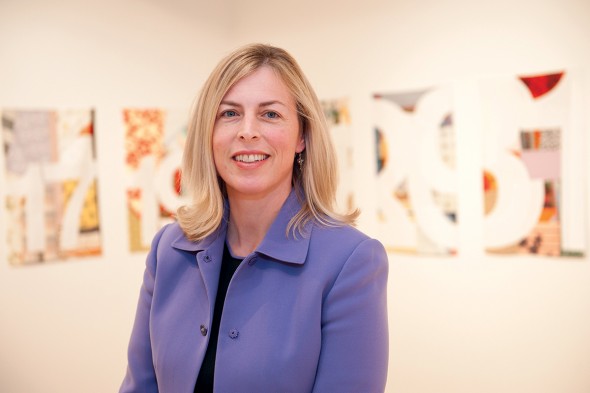Study asks: do the arts make us better people?

People who participate in the arts, especially in the audience, are likely altruistic, says researcher Kelly LeRoux, shown here at Gallery 400. Photo: Roberta Dupuis-Devlin/UIC Photo Services
If you sing, dance, draw or act — especially if you’re in the audience when others perform — you probably have an altruistic streak, according to a study by UIC researchers.
People with an active interest in the arts contribute more to society than those with little or no such interest, the researchers found.
“Even after controlling for age, race and education, we found that participation in the arts, especially as audience, predicted civic engagement, tolerance and altruism,” said Kelly LeRoux, assistant professor of public administration and the study’s principal investigator.
The researchers analyzed arts exposure, defined as attendance at museums and dance, music, opera and theater events, and arts expression, defined as making or performing art.
They also found that, in contrast to findings by earlier studies, Generation X respondents are more civically engaged than older people.
LeRoux’s data came from the General Social Survey, conducted since 1972 by the National Data Program for the Sciences, known by its original initials, NORC. A national sample of 2,765 randomly selected adults participated.
“We correlated survey responses to arts-related questions to responses on altruistic actions — like donating blood, donating money, giving directions or doing favors for a neighbor — that place the interests of others over the interests of self,” LeRoux said.
“We looked at ‘norms of civility,’” she explained, adding, “Previous studies have established norms for volunteering and being active in organizations.”
The researchers measured participation in various groups — neighborhood, religious, civic, fraternal, sports, charitable, political, professional and trade unions.
They measured social tolerance by two variables:
• gender-orientation tolerance, measured by whether respondents would agree to having gay persons speak in their community or teach in public schools, and whether they would oppose having homosexually themed books in the library
• racial tolerance, measured by responses regarding various racial and ethnic groups, including African-Americans, Hispanics and Asian Americans. Eighty percent of the study respondents were Caucasian, LeRoux said.
The researchers measured altruistic behavior by whether respondents said they had:
• allowed a stranger to go ahead of them in line
• carried a stranger’s belongings
• donated blood
• given directions to a stranger
• lent someone an item of value
• returned money to a cashier who had given too much change
• looked after a neighbor’s pets, plants or mail.
“If policymakers are concerned about a decline in community life, the arts shouldn’t be disregarded as a means to promote an active citizenry,” LeRoux said.
“Our positive findings could strengthen the case for government support for the arts.”
The study was based on data from 2002, the most recent year the General Social Survey covered arts participation.
LeRoux plans to repeat the study with results from the 2012 survey, which will include arts data.
The UIC research was part of a nationwide effort funded by the National Endowment for the Arts to learn how individuals’ exposure to the arts affects American society.
Fifteen institutions across the country designed and conducted various studies.
